- Home
- Troy Denning
Last Light
Last Light Read online
Thank you for downloading this Gallery Books eBook.
* * *
Join our mailing list and get updates on new releases, deals, bonus content and other great books from Gallery Books and Simon & Schuster.
CLICK HERE TO SIGN UP
or visit us online to sign up at
eBookNews.SimonandSchuster.com
For Elena Hayday
Bold, brave, and brainy—may your own adventures never require a BR55
CHAPTER 1
* * *
* * *
0832 hours, July 2, 2553 (military calendar)
Crime Scene Charlie, 104 meters belowground,
Montero Cave System,
Campos Wilderness District, Planet Gao, Cordoba System
Special Inspector Veta Lopis had been raised to hate and fear everything about the United Nations Space Command, from its sheer might and criminal war practices to the murderous thugs it called Spartans. So it was only natural to assume that the serial killer stalking the Montero Cave System might be one of the power-armored hulks riding through the darkness with her now. Certainly, the MO fit: the victims had all sustained injuries consistent with a large, mechanically enhanced attacker—injuries such as crushed bones and disjoined limbs, ruptured organs and collapsed skulls.
But good investigators did not let their personal bias influence their thinking. They gathered evidence and weighed facts, and they let the theory of the crime build itself.
So Veta would do what she always did. She would study the victims and establish a timeline for all eight murders, then check it against the known locations of everyone in her suspect pool. She would catalog the weaknesses and habits of the remaining subjects and use that knowledge to put pressure on the perpetrator. Most of all, she would be patient and persistent, and she would keep pushing until the killer revealed himself.
And if that killer turned out to be a towering Spartan in four hundred kilos of Mjolnir armor, Veta would do what she always did.
She would take him down.
The cavern floor began to descend more steeply, then the whine of the electric engines deepened as the rubber-tired Tunnel Weasel changed gears to keep from picking up speed. A moment later, the little tram entered a broad gallery illuminated by the platinum glow of work lamps. Like the rest of Montero Cave System, the gallery was hot, humid, and filled with mineral vapors, but its beautiful flowstone walls were bathed in a cold blue light that made them resemble frozen waterfalls.
As the Tunnel Weasel came to a stop, a trio of UNSC marines in black BDUs emerged from the shadows and approached. They exchanged salutes with a UNSC major seated next to Veta, then an older marine with bushy gray brows stepped forward to report.
“Area secure, Major.”
“Thank you, Sergeant.” The slender officer at Veta’s side was Ira Halal, a black-haired, blue-eyed major sent by the UNSC Judge Advocate General’s Corps to help investigate the murders. So far, he struck Veta as dedicated, intelligent, and reluctant to cooperate. “Any unexpected visitors?”
“Sir, none that we detected.” The sergeant glanced around the perimeter of the gallery, then added, “But the conditions down here wreak havoc with our motion sensors, and twenty-two passages open into this gallery. We couldn’t watch them all every minute.”
Halal nodded. “Of course not,” he said. “It was a long shot, anyway. I don’t think this UNSUB is likely to return to the scene.”
The sergeant frowned. “UNSUB, sir?”
“Unknown Subject of Investigation,” Veta clarified. She stepped out of the passenger compartment. “And I want to check those passages, Major.”
Halal turned to her. “To what purpose?”
“To look for evidence, of course.” Veta paused, reminding herself to play nice, then added, “I like to be thorough.”
Halal did not quite roll his eyes. “Our resources are limited, Inspector Lopis—and so is our time. I suggest we focus on the crime scene and not waste our assets chasing phantoms.”
“I don’t chase phantoms, Major Halal.” Veta stepped close. “I catch killers. Quite a lot of them, actually.”
Halal held her gaze a moment, then smirked. “As you wish, Inspector. We’ll do this your way.”
He ordered the marines back to their posts, then turned toward the Tunnel Weasel, where Veta’s four-member field team was unloading equipment from the third car. On the side of the car, the image of a stylized tree fern sprouted from the letters MVC—the logo of the Montero Vitality Center, from which the UNSC had commandeered the tram.
Watching over Veta’s team were three Spartans in their famous Mjolnir armor. With their blocky helmets and titanium-alloy outer shells, the trio looked more like war robots than human beings—and from what Veta had read about their exploits in the public record, that might be close to the truth. There hadn’t been enough detail for her profiler to suggest how their personalities might have been impacted by such a steady diet of fierce combat, but Veta suspected it wouldn’t be good.
Halal fixed his gaze on the Spartan leader. “Lieutenant, have one of your Spartans secure the adjoining passages and report any evidence of observation—”
“Actually, my team will be inspecting the passages,” Veta interrupted. Whether Halal was trying to hide something or simply did not realize how often serial killers returned to the scene, she could not say. But either way, she was not about to trust any part of the investigation to him or the UNSC. “You’re welcome to send an observer, if you like.”
“Inspector Lopis, these caverns are under military control,” Halal said. “And Spartans are well-trained observers.”
“But they’re not homicide investigators,” Veta said. “And military control didn’t stop our killer from murdering at least eight people down here. Since those people happen to be Gao citizens and these caves happen to be located on Gao, their murders fall under the jurisdiction of the Gao Ministry of Protection—which makes this my investigation.”
Veta paused for emphasis, then continued, “As I said, Major, you’re welcome to send an observer.”
Halal sighed. “We’ll send a guard.” He did not even bother to look at Veta as he spoke. “The last thing I need is to lose someone from your team, too.”
“Too?” Veta asked. “Has the UNSC been losing people?”
“That’s not what I meant,” Halal said quickly. “It’s just procedure, in case the UNSUB is trying to keep an eye on the investigation.”
“You just told the sergeant that you didn’t think our UNSUB was likely to return to the scene.”
Halal shrugged. “I could be wrong.” He turned away, as though intent on watching Veta’s team unload their gear. “As I said, it’s just procedure.”
Halal was lying, of course, and it seemed to Veta that he was worried about something even more dangerous than their UNSUB. But she could not imagine what that might be. The Montero Cave System was the most-visited natural wonder on Gao, a vast labyrinth of interconnected caverns spread beneath a thousand square kilometers of jungle. It had an untold number of access points, including thirty-eight major entrances operated by villages and private spas, and until the killings began, thousands of tourists had entered the caverns each month without encountering anything more hostile than a flight of irritated saurios.
It would have been easy to blame the UNSC and look no further, but the truth was that strange things had been happening in the Montero region for a while. Two and a half months ago, a rare temblor had shaken the entire region, leveling two villages and damaging several spas. Shortly afterward, tourists began to emerge from the caverns miraculously cured of lifelong ailments and terminal illnesses. The newsmongers quickly substantiated the claims, and sick people began to flood into the caves hoping for their own miracles.
Then, a month after the quake, a UNSC task force entered the Cordoba Star System and “requested” permission to conduct research in the caverns. The common assumption was that ONI—the UNSC’s notorious Office of Naval Intelligence—wanted to investigate the miracle cures. Gao’s anti-centralization government denied the request. The task force insisted, and after a tense negotiation, President Aponte reluctantly granted permission to land a small research team.
The “small” team turned into an entire battalion, which promptly occupied the region’s most elegant spa and declared the entire cave system off-limits to everyone else. Predictably, the order inflamed Gao’s fiercely independent citizens, and local guides began to sneak people into the caverns via hundreds of unmapped entrances. For a couple of weeks, the two sides pretended to ignore each other.
Then tourists began to go missing or turn up dead. Suspicion quickly fell on the UNSC, and sales-hungry newsmongers began to press for a harsh response. President Aponte had no choice. He instructed the Ministry of Protection to investigate, then publicly ordered the UNSC to cooperate. To everyone’s surprise, the UNSC commander responded by proposing a joint inquiry.
That had been two days ago. Now, here Veta was, inspecting the first of a long chain of compromised crime scenes with a counterpart who seemed to take her for some ditz who could be intimidated by an air of assumed authority.
Veta stepped into Halal’s line of sight. “Don’t hold back on me, Major,” she said. “It’s a mistake. A serious one.”
Halal finally turned back to her. “Mistake, Inspector?” he asked. “As I recall, I’ve granted every request you’ve made.”
“They’re not requests,” Veta said. “And if you expect me to believe this is some kind of research battalion, you’re a fool. The UNSC is fighting something down here. And you’re so afraid of it that you brought a squad of Spartans to protect us.”
The Spartan leader stepped over to join them. “Ma’am, the 717th Xeno-Materials Exploitation Battalion is a research battalion.” His voice was crisp and deep, even over his helmet speaker. “But even scientific units can find themselves in combat. There are always enemies.”
Veta turned and craned her neck to look up at the Spartan. Standing well over two meters tall in his Mjolnir armor, he was distinguishable from his two female subordinates by the color of his pale blue armor and slightly bulkier shape. It would be difficult to read his reactions beneath all that equipment, but if he was trying to cover for the UNSC—or even just Halal—Veta wanted to know why.
“Let me see if I have this straight,” she said. “The 717th is just an innocent research battalion that’s under attack . . . by what? Cave monsters?” She shook her head. “I’m sorry, but I just don’t believe that, Spartan . . . which one are you again?”
“Fred-104, ma’am. And I don’t particularly care what you believe.” He pointed toward her investigative team. “But it’s my job to protect your people, and I don’t want anyone killed on my watch. If you’ll point out who will be inspecting the passages, I’ll send an escort along to provide security.”
Veta stared up at him for a moment, trying to see through the glare on his faceplate so she could get a read on his expression, but it was no use. The reflective coating seemed designed to prevent anyone from seeing the human face inside a Spartan’s helmet.
After a moment, Veta waved her second-in-command over. “Senola, take a look into the passages around here. See if anyone has been keeping an eye on the crime scene.”
Senola glanced around the cavern perimeter. “Sure, boss.” A green-eyed matron with long blond hair tucked into the hood of her white coveralls, Senola Lurone was a Ministry of Protection veteran fifteen years Veta’s senior. “It might take a while.”
Veta shrugged. “It has to be done.” She let her gaze slide toward Fred. “And you’ll have an escort. Fred-104 here seems to think we could be attacked any moment.”
Senola held Veta’s eyes just long enough to confirm she had taken the hint, then asked, “Really?” She turned to the Spartan. “Who are you worried about, Fred? Maybe you think the Insurrection is starting up again?”
“That’s ridiculous,” Halal interjected. “Gao may have sided with the insurrectionists in the past, but the civil war is over—and no one is going to send a Spartan fireteam to stand garrison against a bunch of disobedient tourists.”
Veta had to give Halal credit. He had recognized Senola’s play and cut her off before she had a chance to put Fred off balance, and now Veta was left wondering whether the major had been trying to protect Fred or some other secret. Either way, it suggested Halal was here as much to manage the situation as he was to catch a killer, and that told her something about the UNSC’s worst fears.
It told her a lot.
Veta looked back to Senola. “Tell Cirilo to use spiders on this one, then go have a look at those passages. I’ll have the major show me around the crime scene.”
Senola confirmed the order with a nod, then Fred took her over to introduce her to the Spartan who would be escorting her.
“Your techs use spiders?” Halal asked, watching the pair depart.
“Trace evidence bots,” Veta explained. “They look like little spiders and crawl all over everything. By the time they’re finished, we’ll have a three-dimensional map of every fiber, skin cell, print, track, and speck of DNA in this place.”
“I see,” Halal said. “Very efficient.”
“Not really.”
Veta wasn’t about to detail the technology’s weakness for anyone from the UNSC, but the spiders were expensive and slow. Each single-use pod cost more than her salary for a year, and a scene the size of this one could take a full week to process.
Fred returned and assumed a position behind Veta and Halal, and Halal led the way toward a pair of high-backed benches about twenty paces ahead.
“Any chance we have a vid or photos of the bodies in situ?” Veta asked.
Halal shook his head. “Sorry. I only arrived a few days ago myself. Prior to that, I’m afraid Battalion was treating civilian deaths as collateral damage.”
“Collateral to what? Nobody’s at war here.” Veta made a point of looking over her shoulder at Fred. “Are they, Fred?”
“If we were fighting a war here,” Fred said, “you’d know it.”
“But you’re here for a reason,” Veta pressed. “As Major Halal said, they don’t send Spartans to stand garrison against tourists.”
“I can’t comment on our mission.” Fred’s faceplate shifted toward Halal. “That would violate security directive Foxtrot Tango Angel 7012.”
“That’s understood,” Halal said. “But your mission does not involve hostilities against Gao civilians. You can confirm that much, Spartan.”
Fred remained silent for a moment, then finally dipped his helmet in acknowledgment. “Yes, sir, I can confirm that.”
“Thank you,” Halal said. They reached the benches and stopped, and he pointed. “The initial attack occurred here.”
Located directly opposite each other, the two benches faced a hissing steam vent—one of the thousands that permeated the Montero caverns. A pair of freestanding lamps lay shattered on the cavern floor. A third bench lay about three meters away, toppled onto its back and bent at the middle.
Veta ignored the scene and turned to Fred. “I’m sure you realize how convenient your security directive sounds.”
“Convenient, ma’am?” Fred cocked his helmet to the side. “In what way?”
“If you can’t tell me who you’re fighting, it’s hard to rule them out as the killer,” Veta said. “So I must assume that you’re keeping me in doubt to protect yourself. I have no choice.”
“Conclude what you want, ma’am,” Fred said. “But you’re misrepresenting what I said.”
“I don’t believe I am.”
“I didn’t say we were fighting anyone,” Fred said. “I said I couldn’t comment on our mission. There’s a difference.”
“The fact that civilian deaths were classified as collateral damage implies armed conflict,” Veta said. “The fact that you sent a Spartan along to guard Senola implies a threat. Stop playing semantics and give me a straight answer.”
Fred’s faceplate turned away from her. “I’m not at liberty to do that, Inspector.”
“Fred is very careful about security,” Halal said, stepping between Veta and the Spartan. “But I assure you, he’s not trying to protect himself or anyone else on Blue Team. Spartans don’t kill for fun, Inspector Lopis.”
Veta studied Halal for a moment, wondering if he realized his attempts to shield Fred only made the Spartan look more suspect, then said, “I’m sure you understand why I can’t simply take your word for that, Major.” She turned back to the benches and activated her handlamp, then began to inspect the area for signs of struggle. “I don’t see any blood here. Where exactly was the body found?”
Halal spoke to a tacpad strapped to his forearm. “Wendell?”
“Ready to proceed, Major,” the tacpad replied.
The tinny voice belonged to the battalion’s artificial intelligence—or rather, the small aspect of Wendell’s consciousness installed in Halal’s tacpad. Veta did not have a full understanding of the capabilities and limits of UNSC AIs, but from what she had observed earlier, Wendell had a similar presence in nearly every piece of battalion equipment capable of hosting a software subroutine.
“Crime Scene Charlie is more expansive and complicated than the others we’ll be visiting,” Wendell began. “As you can see, the initial confrontation occurred here at the vent area itself, but the actual attack . . .”
Knowing she would have a chance to study Wendell’s report at length later, Veta shut the AI’s voice out of her thoughts and began to examine the scene on her own. The floor in this area of the cavern was primarily a concrete tram-path flanked by packed mud, but the benches had been bolted into a small paving-stone circle, which surrounded the natural steam vent. The legs of the missing bench had been snapped off at the bolts, suggesting it had been removed by a single quick, powerful jerk.

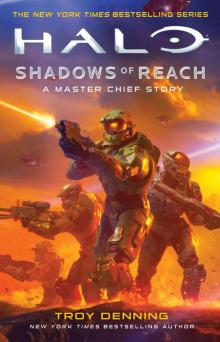 Shadows of Reach: A Master Chief Story
Shadows of Reach: A Master Chief Story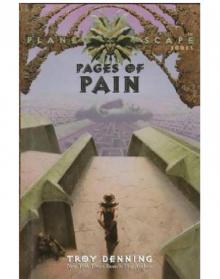 Pages of Pain p-1
Pages of Pain p-1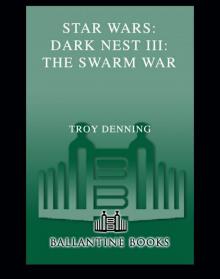 Star Wars 396 - The Dark Nest Trilogy III - The Swarm War
Star Wars 396 - The Dark Nest Trilogy III - The Swarm War Star Wars: Fate of the Jedi: Apocalypse
Star Wars: Fate of the Jedi: Apocalypse A Forest Apart
A Forest Apart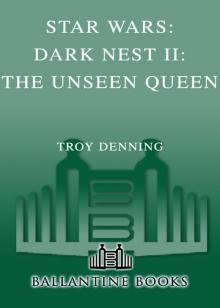 Star Wars: Dark Nest II: The Unseen Queen
Star Wars: Dark Nest II: The Unseen Queen Star Wars: A Forest Apart
Star Wars: A Forest Apart Tempest: Star Wars (Legacy of the Force) (Star Wars: Legacy of the Force)
Tempest: Star Wars (Legacy of the Force) (Star Wars: Legacy of the Force) Star by Star
Star by Star Crucible: Star Wars
Crucible: Star Wars Last Light
Last Light Invincible
Invincible Inferno
Inferno Star Wars - The Trouble With Squibs
Star Wars - The Trouble With Squibs Abyss
Abyss The Verdent Passage
The Verdent Passage Vortex: Star Wars (Fate of the Jedi) (Star Wars: Fate of the Jedi)
Vortex: Star Wars (Fate of the Jedi) (Star Wars: Fate of the Jedi)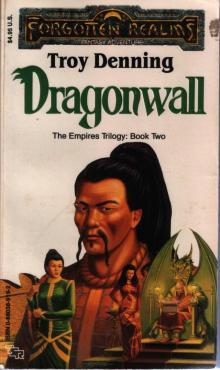 Dragonwall e-2
Dragonwall e-2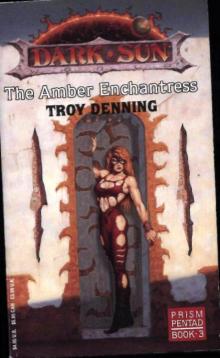 The Amber Enchantress
The Amber Enchantress Crucible
Crucible The Titan of Twilight
The Titan of Twilight Dragonwall
Dragonwall Beyond the High Road c-2
Beyond the High Road c-2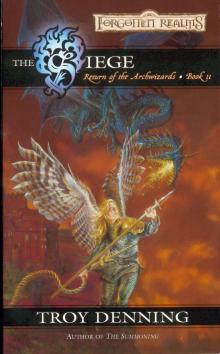 The Siege rota-2
The Siege rota-2 Silent Storm: A Master Chief Story
Silent Storm: A Master Chief Story The Ogre's Pact
The Ogre's Pact The Sorcerer rota-3
The Sorcerer rota-3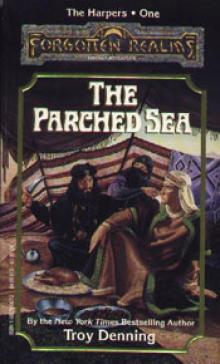 The Parched sea h-1
The Parched sea h-1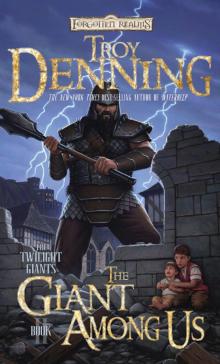 The Giant Among Us
The Giant Among Us Recovery
Recovery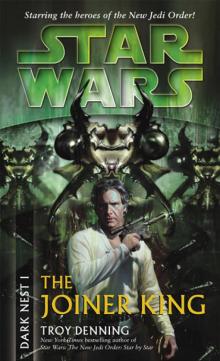 Star Wars: Dark Nest 1: The Joiner King
Star Wars: Dark Nest 1: The Joiner King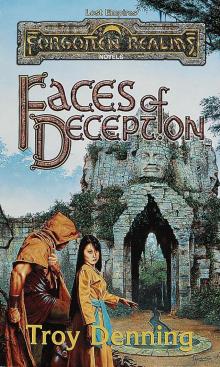 Faces of Deception le-2
Faces of Deception le-2 The Parched Sea
The Parched Sea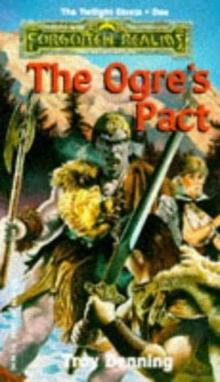 The Ogre's Pact зк-1
The Ogre's Pact зк-1 Apocalypse
Apocalypse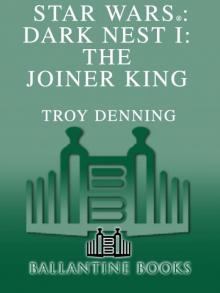 Star Wars®: Dark Nest I: The Joiner King
Star Wars®: Dark Nest I: The Joiner King The Titan of Twilight ttg-3
The Titan of Twilight ttg-3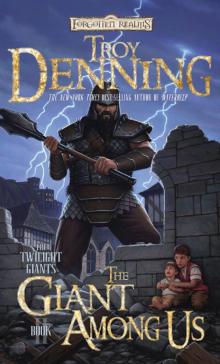 The Giant Among Us ttg-2
The Giant Among Us ttg-2 The Summoning rota-1
The Summoning rota-1 Tatooine Ghost
Tatooine Ghost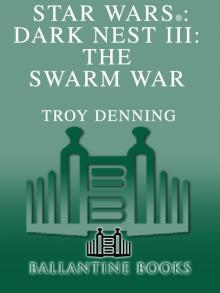 Star Wars®: Dark Nest III: The Swarm War
Star Wars®: Dark Nest III: The Swarm War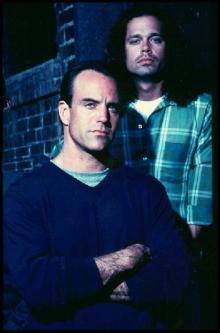 Retribution
Retribution A Forest Apart: Star Wars (Short Story)
A Forest Apart: Star Wars (Short Story) Faces of Deception
Faces of Deception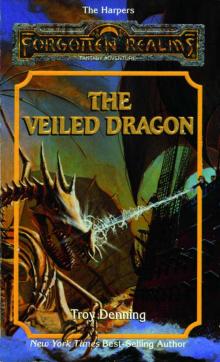 The Veiled Dragon h-12
The Veiled Dragon h-12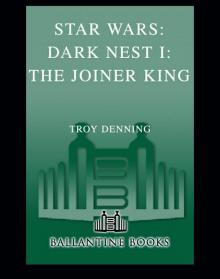 Star Wars 390 - The Dark Nest Trilogy I - The Joiner King
Star Wars 390 - The Dark Nest Trilogy I - The Joiner King Waterdeep
Waterdeep STAR WARS: NEW JEDI ORDER: RECOVERY
STAR WARS: NEW JEDI ORDER: RECOVERY